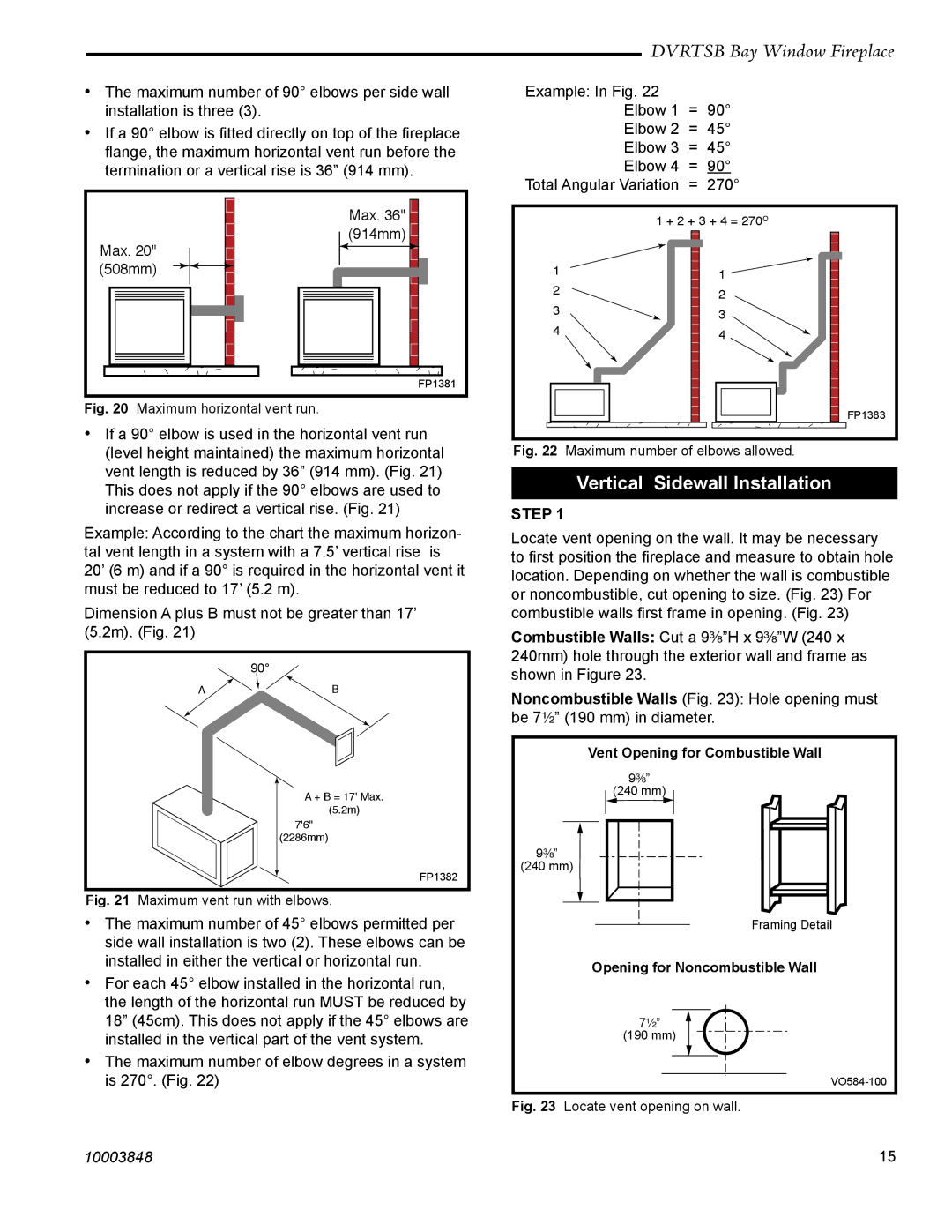
•The maximum number of 90° elbows per side wall installation is three (3).
•If a 90° elbow is fitted directly on top of the fireplace flange, the maximum horizontal vent run before the termination or a vertical rise is 36” (914 mm).
| Max. 36" |
| (914mm) |
Max. 20" | |
(508mm) | |
| FP1381 |
Fig. 20 | Maximum horizontal vent run. |
•If a 90° elbow is used in the horizontal vent run (level height maintained) the maximum horizontal vent length is reduced by 36” (914 mm). (Fig. 21) This does not apply if the 90° elbows are used to increase or redirect a vertical rise. (Fig. 21)
Example: According to the chart the maximum horizon- tal vent length in a system with a 7.5’ vertical rise is 20’ (6 m) and if a 90° is required in the horizontal vent it must be reduced to 17’ (5.2 m).
Dimension A plus B must not be greater than 17’ (5.2m). (Fig. 21)
90°
AB
A + B = 17' Max.
(5.2m)
7'6"
(2286mm)
FP1382
Fig. 21 Maximum vent run with elbows.
•The maximum number of 45° elbows permitted per side wall installation is two (2). These elbows can be installed in either the vertical or horizontal run.
•For each 45° elbow installed in the horizontal run, the length of the horizontal run MUST be reduced by 18” (45cm). This does not apply if the 45° elbows are installed in the vertical part of the vent system.
•The maximum number of elbow degrees in a system is 270°. (Fig. 22)
DVRTSB Bay Window Fireplace
Example: In Fig. 22
Elbow 1 = 90°
Elbow 2 = 45°
Elbow 3 = 45°
Elbow 4 = 90°
Total Angular Variation = 270°
| 1 + 2 + 3 + 4 = 270o |
1 | 1 |
2 | 2 |
3 | 3 |
4 | 4 |
| FP1383 |
Fig. 22 | Maximum number of elbows allowed. |
Vertical Sidewall Installation
STEP 1
Locate vent opening on the wall. It may be necessary to first position the fireplace and measure to obtain hole location. Depending on whether the wall is combustible or noncombustible, cut opening to size. (Fig. 23) For combustible walls first frame in opening. (Fig. 23)
Combustible Walls: Cut a 9³⁄₈”H x 9³⁄₈”W (240 x 240mm) hole through the exterior wall and frame as shown in Figure 23.
Noncombustible Walls (Fig. 23): Hole opening must be 7¹⁄₂” (190 mm) in diameter.
Vent Opening for Combustible Wall
9³⁄₈”
(240 mm)
9³⁄₈”
(240 mm)
Framing Detail
Opening for Noncombustible Wall
7¹⁄₂”
(190 mm)
Fig. 23 Locate vent opening on wall.
10003848 | 15 |
